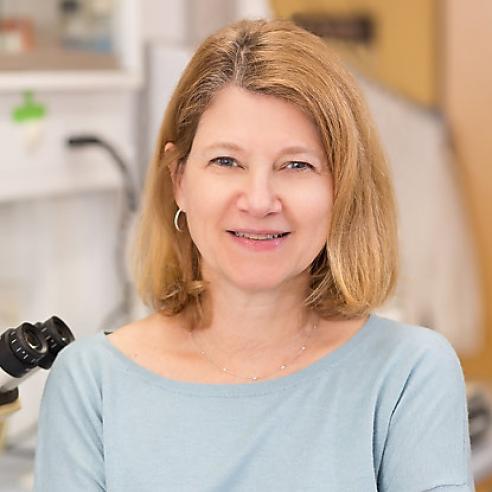Diet, exercise, smoking habits and genes interact to affect AMD risk

A study co-funded by RPB and the National Eye Institute (NEI) points to converging factors that drive disease-related inflammation.
People with a genetic predisposition for age-related macular degeneration (AMD) significantly increased their odds of developing the blinding eye disorder if they had a history of heavy smoking and consistently did not exercise or eat enough fruits and vegetables, according to an observational study of women funded by RPB and the National Eye Institute, part of the National Institutes of Health.
Eating a healthy diet and getting exercise have been shown in earlier studies to protect against AMD, a leading cause of vision loss among people age 50 and older. Findings from this latest study, conducted by a team of investigators at the University of Wisconsin-Madison, suggest that genetic and lifestyle factors may contribute to AMD in a synergistic way. The findings were published online in the journal Ophthalmology.
"If you have a family history of AMD, the good news is that the study findings suggest that there are things you can do to potentially lower your risk of developing AMD yourself," said Julie A Mares, Ph.D., of the University of Wisconsin-Madison. The study teams were led by Dr. Mares and Barbara A. Blodi, M.D., in the Department of Ophthalmology and Visual Sciences, in collaboration with investigators from the University of Iowa, Iowa City, and Oregon Health Science University, Portland.
The researchers studied the risk among women ages 50 to 79 years who had participated in the Carotenoids in Age-Related Eye Disease Study (CAREDS), an ancillary investigation of the much larger Women's Health Initiative, an observational study that has tracked the health-related behaviors and outcomes of more than 160,000 women since 1991.
For the current study, first author Kristin J. Meyers, Ph.D., and her team evaluated the diet and exercise patterns of 1663 women and categorized them into lowest-, moderate- and highest-risk groups. They also evaluated whether the women smoked and, if so, how many years they smoked a pack of cigarettes or more each day. They also assessed genetic data from the women to determine whether they carried known genetic risk factors for AMD. They looked most closely at an allele (version) of the complement factor H (CFH) gene that is known to be associated with greater AMD risk, probing whether the women had zero, one, or two copies of the allele.
A total of 337 women in the study developed AMD, of whom 91 percent had early-stage disease.
Among women with stable diets, those who carried two high-risk genetic alleles, smoked at least seven pack-years, and were in the highest-risk diet and exercise categories were more than four times more likely to have AMD compared to those women who did not have genetic risk factors and who ate a healthy diet and got at least 10 hours/week of light exercise (such as housework or walking at a pace you could sing to) or at least eight hours of moderate activity (such as brisk walking).
In addition to lifestyle contributions, vitamin D levels may play a synergistic role with genetic factors, according to the findings of another study by the same team involving 913 CAREDS participants. Amy E. Millen, Ph.D., that study's first author, found that blood levels indicating vitamin D deficiency (less than 12 ng/mL of 25 hydroxyvitamin D) were associated with a 1.8-fold increase in the odds of having AMD among women with no risk alleles, but a 6.7-fold increase in the odds of having AMD among women with two risk alleles, compared with women who had no genetic risk alleles and adequate levels of vitamin D. The findings of the vitamin D study were published in JAMA Ophthalmology.
"The findings of both studies support the notion of biologic synergy. That is, that one's genes, lifestyle factors and nutrition all come together in a synergistic way to mediate inflammation, which is a key mechanism involved in AMD," said Dr. Mares. "There's a large body of evidence that unhealthy lifestyle habits are associated with inflammation and that CFH risk alleles augment inflammatory responses. Vitamin D is believed to suppress inflammation, which is thought to enhance the AMD disease processes both directly and indirectly."
(Press release by NEI)
September 18, 2015
Related News: Macular Degeneration

Research to Prevent Blindness and Association of University Professors of Ophthalmology Announce 2025 Recipient of RPB David F. Weeks Award for Outstanding Vision Research
Maria Bartolomeo Grant, MD, is recognized for ground-breaking contributions to the field of vision research.

Research to Prevent Blindness and Association of University Professors of Ophthalmology Announce 2024 Recipient of RPB David F. Weeks Award for Outstanding Vision Research
Patricia Ann D’Amore, PhD, MBA, is recognized for ground-breaking contributions to the field of vision research.

Research to Prevent Blindness Marks $400 Million in Funding to Advance Eye Disease Research
RPB funds a new round of researchers and hits a milestone in supporting vision-related breakthroughs.

RPB Funding Helps Researchers Revive Light-Sensing Cells in Organ Donor Eyes
This ground-breaking research accomplishment will open new doors for research on neurodegenerative diseases like AMD.

Recording available: RPB webinar on Dry AMD and Geographic Atrophy
RPB grantees provide expert insight on geographic atrophy and dry AMD as part of the "Lunch & Learn" series.

Join Us for AMD Awareness Month
Join RPB and Apellis Pharmaceuticals for a virtual event on Feb. 25 to learn about cutting-edge research into geographic atrophy and dry AMD.
Subscribe
Get our email updates filled with the latest news from our researchers about preventing vision loss, treating eye disease and even restoring sight. Unsubscribe at any time. Under our privacy policy, we'll never share your contact information with a third party.
| General Info | Grants | News & Resources |



